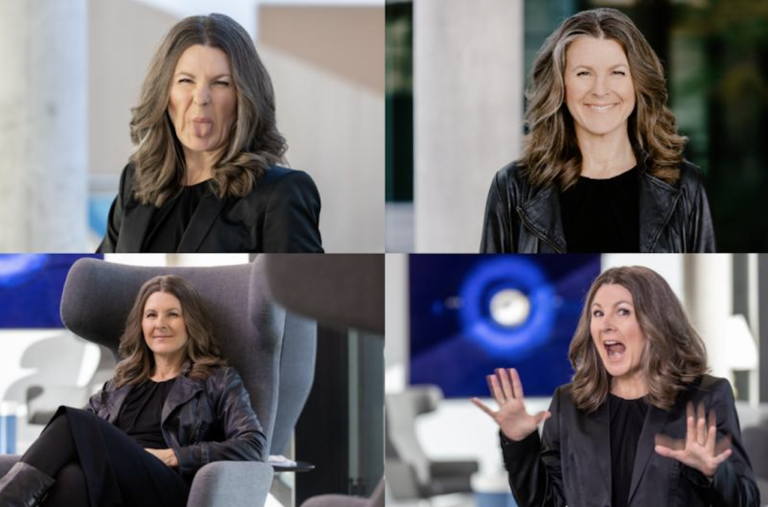She has been voted one of the most inspiring women in Germany. Off-road motorbiking, plays in two bands, her own and one at Microsoft, and as the Head of IT at Microsoft, she is creating new work environments to meet the needs of people today and in the future: Meaningful, flexible work settings that enable everybody to learn and thrive. We met Anna for a chat about how to become a pro in mastering hybrid work.
How courageous do you need to be to succeed in the new normal?
I’m only as cool as I build my brand. Being courageous is being true about who you are. We have a motto at Microsoft: Come as you are – do what you love. So, for example, I have tattoos, I am a biker, a rocker, and there used to be a time when I would hide that. But being yourself demonstrates authenticity, and people’s admiration is not for what I am, but what I dare to be instead of hiding it. Another thing is that I earn my respect for my skills and competence, and not for my title.
What is the driver of this change?
In the future, there is going to be a lot of automation. Your USP in this new world is the courage to be yourself. Your personality. Your drive. Your passion. Your interest – what you bring to the table. If we are different people, we have different ideas and thoughts thrown into the mix, which is another competitive edge.
So the new world asks you to be more yourself?
Yes! It sounds simple, but it is, in fact, a key step. Especially when you are a woman. I had a keynote, and this young woman came up to me; she was almost crying. She was doing her Ph.D. and had been told by her professor, ‘Adjust to the majority. Be quieter. Don’t talk so much’. I hugged her, and I felt so sad. Imagine being told, ‘Don’t be yourself.’ This still happens and is destructive for the fast changes we need to adapt to.
Is hybrid work the end of the boss era?
Definitely. Being bossy is an absolute ‘NO’ because traditional bosses often give orders instead of leading the way and indicating the direction. Being a successful leader in hybrid work settings is about reducing the ego for the greater good of the team’s performance.
Would you share your personal prioritization routine?
I think my career checklist is a helpful example. I have five questions to help me prioritize. Other people might discover a different five points for themselves. Mine are:
- Does this help me with my manager to get my bonus so that he says: ‘Good job this year’?
- Does it help me to build relationships with important people so my career goes well?
- Does it help me to build a mutual network of give and take?
- Does it help me with my external reputation?
- The last point is: Do I enjoy it?
If a decision doesn’t fall into this, I will deprioritize it. The modern world will overrun us with dos and actions. This train is not going to stop – so we need to ensure we bring our own value to the job and let automation do the rest.
How do you ensure that, as a leader, you have backing for the needed changes to ensure productivity?
It’s all about transparency and trust. First of all, leaders need to build trust, which will take some time. You need to say: ‘Dear employee, I trust you that you are doing a great job!’, and mean it. The second part of the puzzle is to offer assistance whenever needed. With all the incentivization, bonuses, and performance reviews, you have to shift the conversation to the what. The what and the how and with whom, so you are having a conversation about the outcome and the quality, not about the time you attend at your desk.
The new world needs self-motivated, self-driven people that enjoy delivering the results we agreed upon.

But what if your leaders are struggling with the hybrid setting?
Hybrid work, not having everyone punctual around you as a leader, is a challenge. You have to agree on what results are to be delivered and prioritized. Top-down as well as bottom-up. If someone delivers their results, I don’t care if they do it remotely, from the beach, in the morning, or the evening. They have kids and want to leave in the afternoon but continue in the evening? Fine for me! As long as the results keep coming.
Does this mean the new world is also about more responsibility to contribute to delivering on the strategy?
Exactly. You need to stop micromanagement and instead talk about the impact of the outcome. If your employees are clear on what they want to deliver in the following weeks, months, years, you just need to offer help when needed. People are always very surprised that my calendar has airspace.
How do you deal with envy in work settings where some people work in the home office and some can’t?
I would say: ‘It’s your choice’. The reality is if somebody decides to work mainly remotely because they moved to the countryside or to have more freedom to organize their family, then they have to accept that they are not as seen as they would be in the office. Also, people pick their careers, and if you go for a job that is not in the information worker space, this might not be possible for you.
How do you answer employees that work in settings where home office is not possible?
You can possibly find small pockets of ways to allow more freedom and flexibility even for those employees. For example, there are supermarkets that allow their subsidiary leads to do reports, purchase orders, and invoices from home. Or if people from the production line need to do training – they can do it online and do not need to come in for that. It is important to have transparency about who works from where and why. This is why we developed a work style one-pager, a great tool to share your workstyle in your team and organize and coordinate collaboration.
But this means managers also need to offer this transparency and open the space…
A good point because we need role models. I have my way of working, and I have clearly shared that with my team. I was doing sports during the day, taking an hour to go for a walk. I take my freedom, and I encourage that. Transparency is important. To give as well as to get!
The Cultural Foundations of Hybrid Work
Anna Kopp joined The DO Founders Florian Hoffmann and Katherin Kirschenmann to discuss key insights into navigating the challenges of hybrid work.



